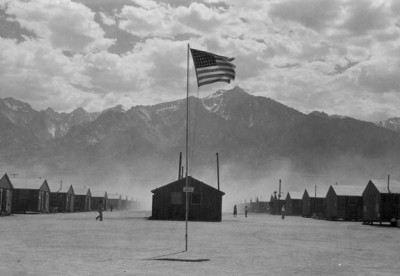Antonin Scalia 2014 Statement, US Supreme Court Justice Declares “Mass Internment Inevitable”

In the wake of Judge Scalia’s passing, we bring to your attention this article originally published in February 2014:
Referring to America’s mass internment of people of Japanese ancestry during the Second World War, current Supreme Court Justice Antonin Scalia declared:
“[Y]ou are kidding yourself if you think the same thing will not happen again.”
Scalia made these comments during a speech to students at the University of Hawaii on February 3. He was asked about the Supreme Court case of Korematsu v. United States (1944), which involved a legal challenge by two Japanese Americans—Fred Korematsu and Gordon Hirabayashi—to orders to report to mass internment camps during the war. On appeal, the Supreme Court infamously declared the internment camps constitutional on the grounds of “military urgency.”
Hawaii, where Scalia was speaking, was one of the many states in which internment camps were established.
“Well of course Korematsu was wrong,” Scalia said, in comments reported by the Associated Press. “And I think we have repudiated it in a later case. But you are kidding yourself if you think the same thing will not happen again.”
Scalia invoked the Latin expression, “Inter arma enim silent leges” (roughly, in times of war the law is silent).
“That’s what was going on—the panic about the war and the invasion of the Pacific and whatnot. That’s what happens. It was wrong, but I would not be surprised to see it happen again, in time of war. It’s no justification, but it is the reality,” he said.
While Scalia’s remarks took the form of nominal disapproval of the Korematsucase and mass internments, his shoulder-shrugging at “the reality” of future mass internments should be taken as a serious warning.
Since Scalia’s arrival on the Supreme Court in 1986, he has been a leading figure in the ongoing rollback of democratic and social rights. Some of the highlights of Scalia’s career include Stanford v. Kentucky (1989, upholding the death penalty for crimes committed by 16 and 17-year-olds), Bush v. Gore(2000, halting vote counting and installing George W. Bush as president), and Citizens United v. Federal Election Commission (2010, removing limitations on corporate spending during elections), among many others.
There is an element of arrogant pageantry and provocation to everything Scalia does, both in his official and individual capacities. In 2004, Scalia famously went on a hunting trip with Vice President Dick Cheney while a case involving the latter was pending before the Supreme Court, in flagrant violation of judicial ethics. Scalia’s contempt for the principle of separation of church and state is frequently on display, as in a 2012 speech arguing that the position that “our Constitution forbids anything that favors religion over non-religion is a lie.”
Scalia’s pronouncement on the inevitability of mass internment borrows not a little from fascist jurisprudence. Nazi jurist Carl Schmitt developed the theory that a national emergency could constitute a “state of exception” (Ausnahmezustand) pursuant to which the executive may ignore the rule of law, the Constitution, and democratic rights. Similarly, Scalia imagines a scenario in which mass incarceration in the US would technically be unconstitutional, but “in times of war the law is silent.”
With these comments, Scalia is effectively signaling that if concentration camps are established in the US (Scalia would “not be surprised”), the Supreme Court will stand aside and acknowledge itself powerless—doubtless with references to “national security,” “state secrets,” the “separation of powers,” the “war on terror,” and “deference to the executive in wartime.”
During the Second World War, some 110,000 people of Japanese ancestry were forcibly removed to “War Relocation Camps,” where they lived in ramshackle barracks surrounded by machine gun nests and barbed wire. President Franklin D. Roosevelt gave orders authorizing the establishment of the camps in 1942, and in major cities official notices were posted: “Instructions to all persons of Japanese ancestry” to report to gathering sites for transportation to the camps. Those who failed to comply were seized and prosecuted. Newspapers such as the Los Angeles Times whipped up panic and xenophobia, infamously justifying the mass internment of Japanese Americans on the grounds that “we are at war with their race.”
Similar “exclusion orders” went into effect for Americans of German and Italian ancestry. The Korematsu decision justifying mass internment has long been considered a shameful chapter in the Supreme Court’s history, forming part of the anti-canon of cases that includes Dred Scott v. Sandford (1857, defining slaves as property) and Plessy v. Ferguson (1896, upholding segregation).
In 1988, none other than President Ronald Reagan signed an official apology for the internments, blaming what took place on “race prejudice, war hysteria, and a failure of political leadership.” Ultimately, approximately $1.6 billion was paid in reparations to the victims.
With Western “social democracy” in free fall collapse in the first decades of the 21st century, and with world war again threatening from innumerable global flashpoints, it would be a mistake to write off Scalia’s remarks as the idle hypothesizing of an old reactionary.
In the aftermath of the September 11, 2001 attacks, as many as 1,200 people were illegally rounded up and detained simply for being Arab or Muslim. The National Defense Authorization Act (NDAA) for Fiscal Year 2012 expressly gives the military the power to seize and imprison any person anywhere in the world, including within the US, on “terror” allegations—without charges, evidence, or trial.
According to documents released by Edward Snowden, the US government is already using its mass spying apparatus to construct “political profiles” of individuals. Last year, the city of Boston was placed under military lockdown, with families ordered to “shelter in place” while armed commandos conducted house-to-house searches.
In this context, Scalia’s comments doubtless reflect current moods and discussions now taking place within ruling circles. If anyone does not think it is possible for mass internment camps to be set up within the US—to use Scalia’s words, “you are kidding yourself.”

